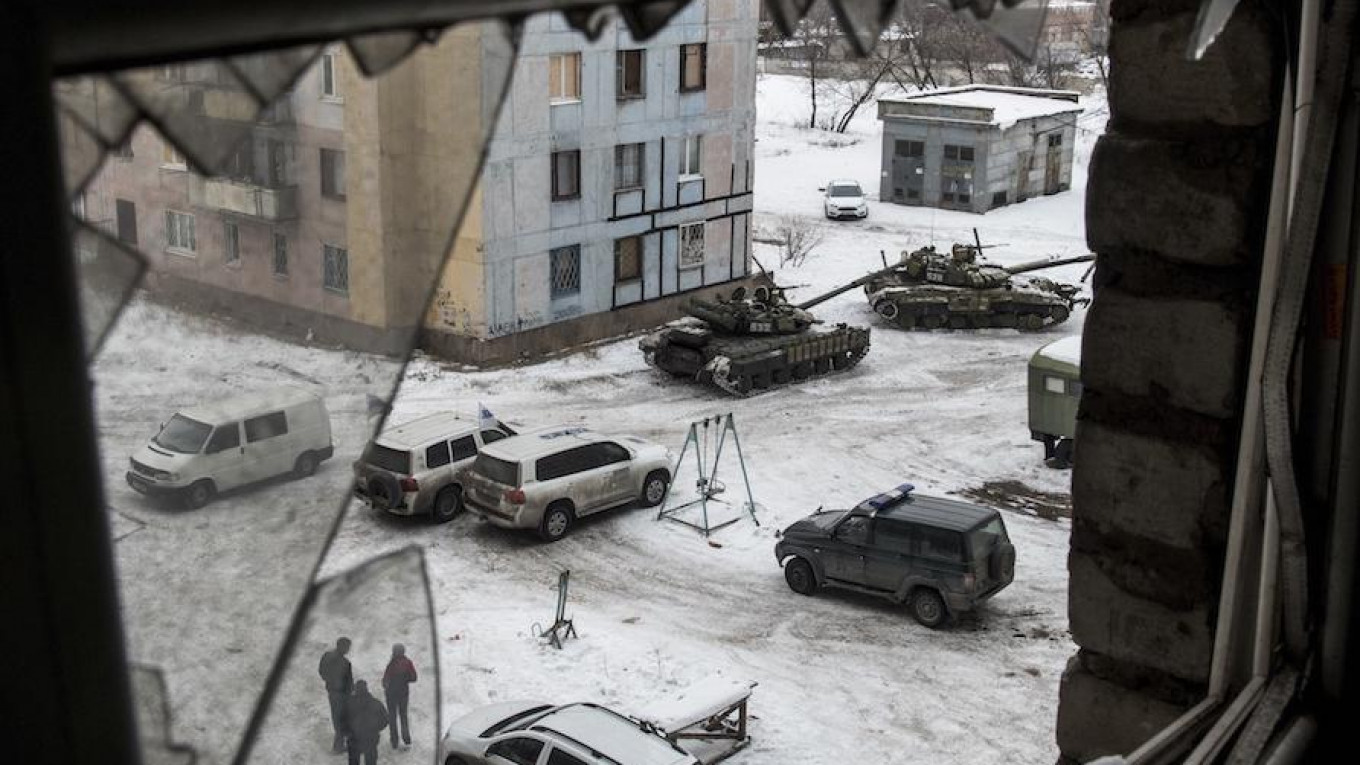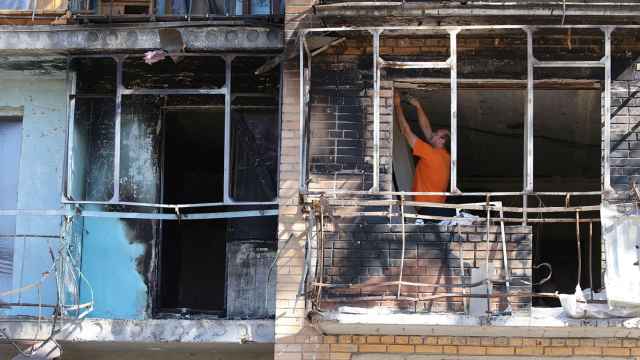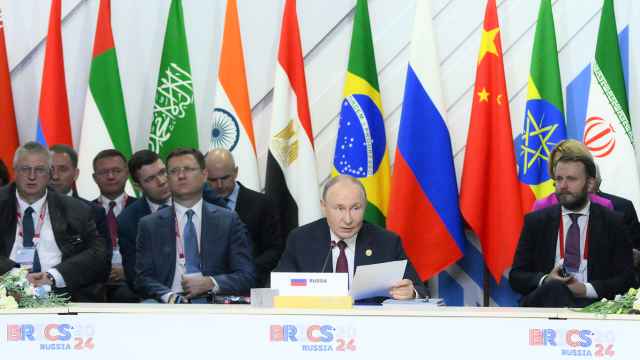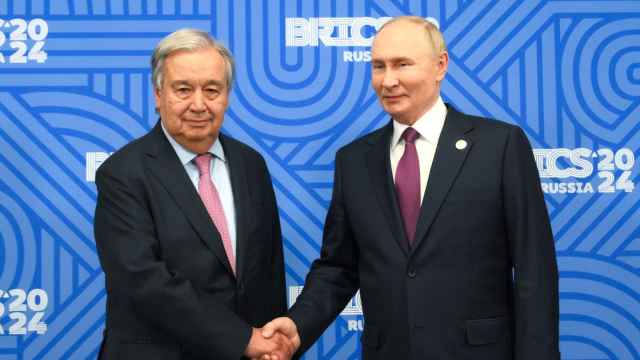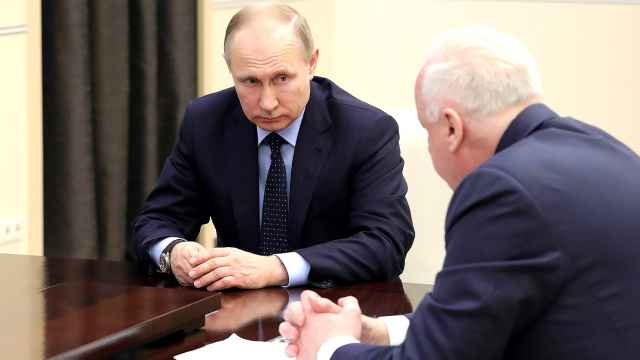The latest flare-up of violence in Eastern Ukraine, which subsided over the weekend, is not about changing the status-quo or a warming-up for a another major escalation. It is an inescapable result of the fog of war, which the Minsk peace agreements has failed to completely stop. It is also a sign that the peace process is failing.
Ukrainian forces may have stumbled into renewed hostilities by accidentally taking an important separatist position in a grey zone. But they have not crossed the official separation line or pushed the separatists from territory designated as under Ukrainian control in the Minsk-2 agreements.
Moscow has responded to the escalation by blaming Kiev. The Kremlin’s spokesman Dmitry Peskov said with a smirk that he hoped the separatists in Donbass would not run out of ammunition to repel the Ukrainian advances. This was just an elegant way of saying that Ukraine should not harbor any hopes of achieving a military solution in Donbass.
But the Kremlin was quick to use the episode to remind the Trump administration that the Ukraine crisis demands the urgent attention of the superpowers. The message was that Moscow must be engaged by Washington sooner rather than later.
The arrival of the Trump administration in Washington has raised hopes in Moscow and fears in Kiev that the US will bring a new approach to resolving the conflict in Donbass. The key question now is whether this approach will be within the framework of the Minsk process, or whether it will take a radically new turn.
Moscow clearly wants Kiev to implement its vision of the Minsk agreement — a special status for the separatist controlled areas, retaining Russian-backed armies and de-facto control of the border with Russia, with only nominal oversight from Kiev.
The Kremlin wants to retain political control over separatist-held territory as a “structural veto” on Ukrainian security and foreign policy. Moscow hopes that the Trump administration alongside France and Germany will pressure Poroshenko to accept Russian demands under Minsk-2.
The Kremlin’s ideal scenario is that Russia would retain informal control over Donbass even after Western sanctions are lifted.
Under its current leadership, Kiev cannot — and will not — implement the Russian vision of Minsk-2. But it could implement some political aspects of the agreement — elections, decentralization — were Moscow to completely and verifiably withdraw from Donbass and dismantle the separatist-held territory.
Moscow views Poroshenko as weak and wounded. The Kremlin hopes for snap parliamentary elections and a new, friendlier government in Kiev. It is betting on a broad coalition of Yulia Tymoshenko’s Fatherland party and the Opposition Bloc of Yuri Boiko, with Viktor Medvedchuk in between as Putin’s agent of control.
But these hopes spring eternal, and Poroshenko is likely to outsmart the Kremlin by splitting the Opposition Bloc in two. The question hanging in the air is: what happens if Kiev balks from implementing Minsk-2?
It isn’t clear if the Trump administration is interested in sticking to the Minsk-2 framework as Europe and Moscow want it to. It appears to be moving toward decoupling U.S. sanctions on Russia from its implementation of Minsk-2. U.S. Vice President Mike Pence suggested on Sunday that the U.S. could lift sanctions on Russia in the coming months if President Vladimir Putin cooperates with the administration’s fight against Islamic State.
Pence also conditioned the lifting of sanctions on “a change in Russian posture.” This ambiguous wording could have been a reference to certain Russian concessions on Ukraine — most likely the withdrawal of Russian forces and weapons from Donbass.
If U.S. sanctions on Russia are lifted before Russia returns the control over the border to Ukraine, as envisaged under Minsk-2, Ukraine will be free from its obligations as well. Whether the fighting would resume at that point is anybody’s guess.
Other signs point to Trump’s interest in pushing for a larger settlement between Russia and Ukraine. This would include Russia’s complete withdrawal from Donbass, Ukraine’s recognition of Russian sovereignty over Crimea, Russia’s financial compensation to Kiev for Ukrainian assets in Crimea and the reconstruction of Donbass, along with a complete lifting of all sets of sanctions, perhaps even unilaterally from the EU.
It isn’t surprising that Trump, in the art of the deal, may want a direct negotiation between Moscow and Kiev with America acting as a chaperon. This could be more productive than the sham of Minsk-2 where Kiev has to negotiate with the “republics.”
The White House readout of Trump’s phone call with Poroshenko uses the term “Ukraine’s long-running conflict with Russia” and promises to “work with Ukraine and Russia to restore peace at the border.” This may seem to be bizarre and careless wording, but it bluntly challenges the Russian narrative and the Minsk-2 pretence that the war in Donbass is an internal inter-Ukrainian conflict.
It isn’t clear whether Moscow is interested in making the concessions that Trump seems to be expecting in order to close the deal on Ukraine and sanctions. But Foreign Minister Sergei Lavrov said in an interview over the weekend that Russia was prepared to “walk her part of the road’ towards better relations with the US.
We have yet to see where that road will lead.
A Message from The Moscow Times:
Dear readers,
We are facing unprecedented challenges. Russia's Prosecutor General's Office has designated The Moscow Times as an "undesirable" organization, criminalizing our work and putting our staff at risk of prosecution. This follows our earlier unjust labeling as a "foreign agent."
These actions are direct attempts to silence independent journalism in Russia. The authorities claim our work "discredits the decisions of the Russian leadership." We see things differently: we strive to provide accurate, unbiased reporting on Russia.
We, the journalists of The Moscow Times, refuse to be silenced. But to continue our work, we need your help.
Your support, no matter how small, makes a world of difference. If you can, please support us monthly starting from just $2. It's quick to set up, and every contribution makes a significant impact.
By supporting The Moscow Times, you're defending open, independent journalism in the face of repression. Thank you for standing with us.
Remind me later.



